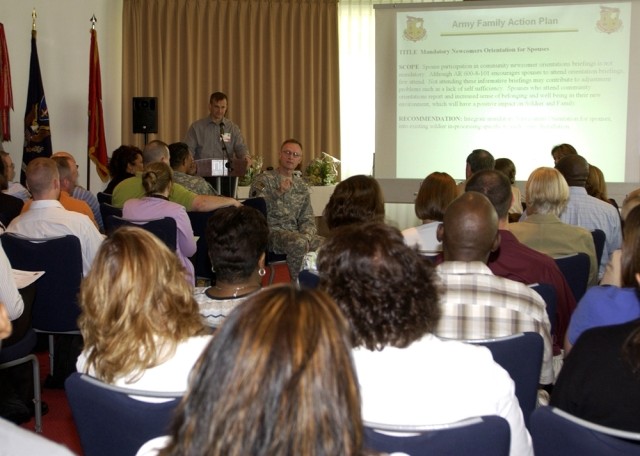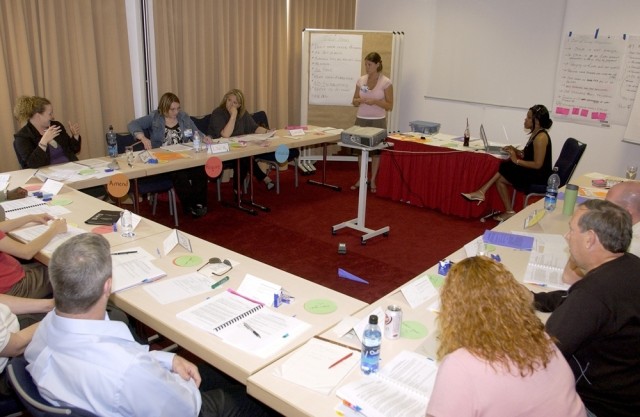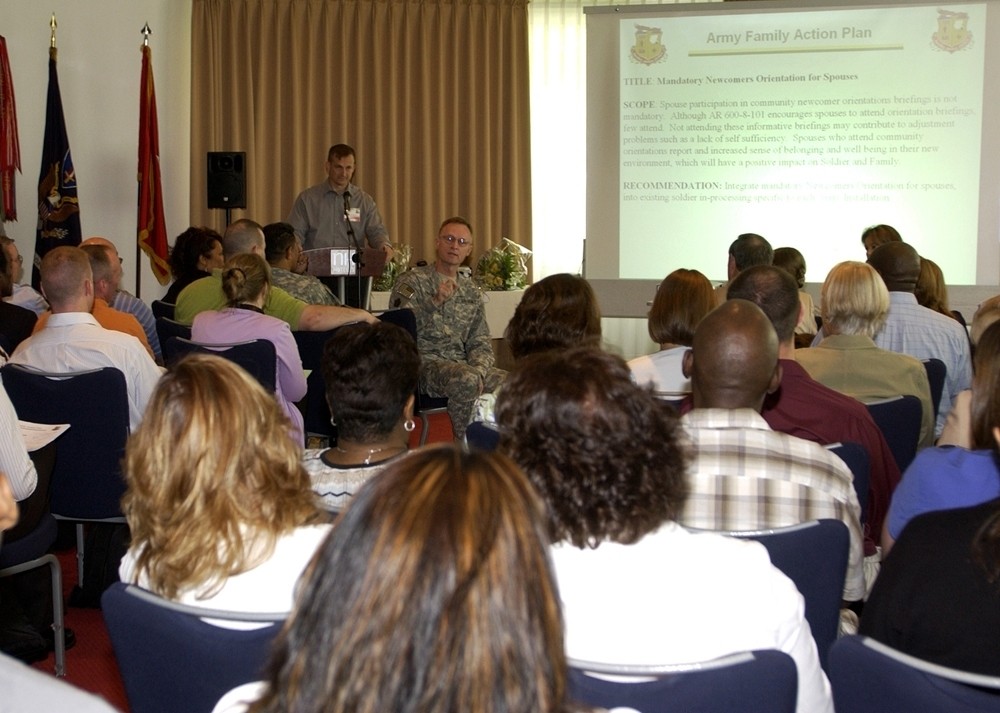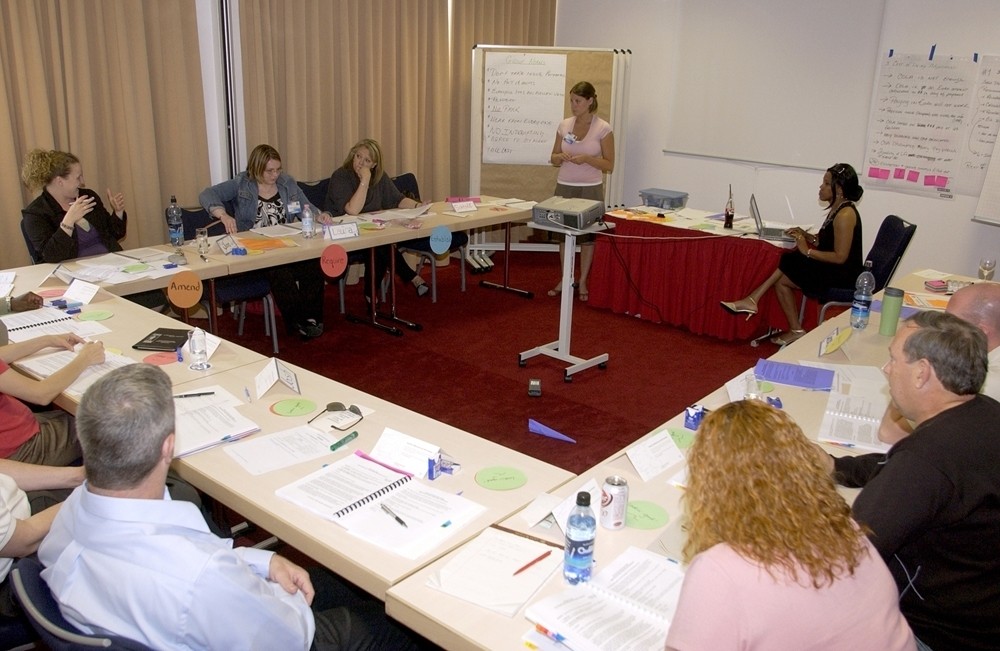HEIDELBERG, Germany - Delegates representing Army communities across Europe came together at the Army in Europe and Installation Management Command-Europe Army Family Action Plan conference in Weinheim, Germany, May 12-16 to let senior leaders know what issues the total Army family here would most like resolved.
The event is a "grassroots forum" that gives delegates speaking on behalf of their communities' active and reserve component Soldiers, civilian employees, Family members, retired service members - even children and teens - an opportunity to talk openly and directly with leadership about their concerns, AFAP officials said.
"It's about the Soldiers, civilians, Family members, and doing something for them that we need to do," said USAREUR Chief of Staff Brig. Gen. Rusty Frutiger just after his briefing on the conference's findings. "It's absolutely important that we hear from them, we know what they want. Beyond what we do every day, there's always a need out there that needs to be taken care of, that we don't see, and that's why these conferences are so important. We hear the voice of the Soldier, we hear the voice of the civilian, and we hear the voice of our Family members."
"AFAP is really a democratic process," said Jane Helfrich, IMCOM-E AFAP program manager. "It's really the voice of the Army people, if you will."
That voice can address virtually any topic related to Army life. The only restrictions to issues presented to the AFAP program are that they must have a measurable end product, be within the capability of an element of the Department of Defense to resolve or influence, not duplicate issues presented within the previous three years, and be "mindful of the current political and resource environment," said Patricia Centeno, AFAP program analyst for the Army's Family and Morale, Welfare and Recreation Command.
While the USAREUR and IMCOM-E conference is an annual gathering, it is the culmination of a continual AFAP process, added Helfrich. Representatives at each installation in Europe continually work on local issues, she said, and then compile their concerns at community AFAP conferences in the months leading up to the USAREUR and IMCOM-E event.
The 59 delegates who gathered in Weinheim examined 57 concerns forwarded from those community conferences. The subjects touched perhaps every area of Army life, including child care, education, medical and dental treatment, youth programs, transportation, wounded and single Soldier initiatives, spouse employment, active and reserve component Soldier entitlements, and benefits for retired service members.
With the help of AFAP facilitators and subject-matter experts, the delegates split into work groups focused on four overarching issue areas - community and family support, force support, health care, and employment and commercial services - to select the top issues in each area, then refined those concerns and wrote recommendations for acting on them. At week's end the groups shared the top 13 issues and recommendations with Frutiger, highlighting three issues the 59 delegates voted most important of all.
Those 13 issues - four in force support and three apiece in each of the other areas - will be prepared for presentation to a USAREUR AFAP steering committee meeting later this year, Helfrich explained. Some of them will be resolved locally, while others will be forwarded to the Department of the Army, Department of Defense, or even higher levels.
"If (our senior leadership in Europe) can solve a problem, they will. They'll work very hard to do that. That's why it's our job to make sure that the issues are well crafted, that they are achievable, that they are realistic - that they are something we can really do something about," she said. "That's not to say that every single good idea gets implemented, but we try our best."
Centeno said 90 percent of AFAP issues are addressed at the local level, but added that more than 60 percent potentially affect all the military services. Some may reach beyond DoD, she said, because they require legislative changes.
The AFAP program claims some significant successes in its 25-year history. Since its inception, Centeno said, the program has examined hundreds of issues that have resulted in 102 changes in legislation, 152 policy and regulation changes, and 168 improvements to Army programs and services or their funding. The program has spawned initiatives that have become household words in the Army, she added, such as the Army Family Team Building, Better Opportunities for Single Soldiers, and military Thrift Savings Plan programs. She and Helfrich said with pride that the hiring of paid Family Readiness Support Assistants across the Army began as an issue at a USAREUR AFAP conference.
The average time for an issue to be resolved is two years, Centeno said, and all issues remain active until they are resolved, citing one that has been active in the Army AFAP system since 1984. She did note that issues might be overcome by events or become obsolete, but said the program and the demographics of its delegates change continually to adapt to shifting trends.
"The nice thing about AFAP is it really does evolve with what's going on in the Army," Centeno said.
Many participants said working on the AFAP issues, whittling them down in group sessions, talking with subject-matter experts, writing decision papers, was hard work. Yet most said they were excited to participate, and radiated a kind of passion for the process.
"It does seem like a big bite to chew, but we somehow manage to get it done, because the delegates care so much," said Katie Server, AFAP and AFTB program manager for U.S. Army Garrison Ansbach. "They want to have progress, they want to have an end product to show, and (they) really put some care and meaning into it."
"The Army is our family and you have to live with it, so you might as well do whatever you can to make it the best possible experience that you can, so ... improving it is kind of your duty as well. It's an obligation, because we are living this experience," she said.
"People are in a very high-energy, let's-get-this-done mode," Helfrich said. "People are really happy to be here. There's lots of energy, lots of laughter, lots of talking, lots of networking, and more than one delegate has come up to me and said, 'This is a really awesome experience. I'm so glad I'm here.'"
Halfway through the conference, Katy McClelland, FRSA for the 123rd Main Support Battalion in Dexheim, Germany, said she enjoyed digging through the issues, but expected the "a-ha! moment" to come when the teams presented their final briefings to Frutiger and USAREUR Command Sgt. Maj. Iuniasolua Savusa at week's end.
"It's very satisfying to get down to the nitty-gritty, (to) work at the different topics at hand. I love working through problems, so that's always a rush for me. It's exciting," she said. "But I have a feeling the real satisfaction will come when we brief out and know that the problems that we have worked have hopefully been looked at and resolved."
True to McClelland's prediction, the group was in high spirits at the final briefing, and more than once spontaneous cheers and applause filled the room when Frutiger or Savusa told them an issue would be addressed and resolved locally if at all possible.
Staff Sgt. Jeffrey Moseley, a media gateway supervisor with the 181st Signal Company in Landstuhl, Germany, served as a facilitator for the conference. He said he has been involved with the AFAP program for four of his five years of service, because the program dispels the myth that things can't change in the Army.
"It is very important that (every member of the Army family) know that command is paying attention to their problems, because there is a perception in the Army that, 'Well, welcome to the Army,'" Moseley said. "That's the standard answer for everything that's wrong: 'Well, welcome to the Army.' 'Why is it that way' Because it's the Army.' And that's not the case, and AFAP has proved that it doesn't have to be the case - that anything can be changed. Legislation can be changed, Department of Defense policies can be changed, other branches can follow our lead. We've exhibited that, we've done that, and I think people put a lot of faith in this process now, from the top down and from the bottom up."
The top 13 USAREUR and IMCOM-Europe AFAP issue recommendations, with the top three noted with an asterisk, are:
Community and Family Support:
*Establish educational pre-kindergarten within the existing Department of Defense Dependent Schools framework, available to all children.
Amend the Exceptional Family Member Program screening process to include special-needs child care.
Integrate mandatory newcomer orientation for spouses into existing Soldier in-processing, specific to each Army installation.
Force Support:
Amend regulations and statutes to conduct a monthly local market analysis of utilities costs, in order to recalculate Overseas Housing Allowance utility entitlements, and include actual utilities usage and cost in the OHA survey.
Incorporate a standard Army Family Team Building orientation briefing within the unit annual training plan and mandate the tracking and monitoring of Soldier AFTB training.
Authorize a Dislocation Allowance entitlement to include all honorably discharged service members separating from the military.
Mandate a dedicated line item budget entry with fenced appropriated funds for each installation Better Opportunities for Single Soldiers program.
Health Care:
Establish regional Multi-Service Market Offices to consolidate and integrate existing medical resources within each region to promote efficient use of medical assets and lessen travel requirements for patients needing specialty medical care; establish long-distance health communication such as tele-health, telemedicine and video teleconferencing for meeting with specialty care providers; and centralize referral management
Authorize an annual round-trip flight to a continental U.S. point of entry for children separated from a parent by an overseas duty assignment, and authorize a flight for a guardian to accompany a child, if required by regulation.
Provide no-cost meals for breastfeeding mothers when their infants are hospitalized for inpatient treatment.
Employment and Commercial Services:
*Amend applicable Army regulations to include standardized position descriptions, training and individual development plans for Family Readiness Support Assistants and Family Readiness Support Technicians.
Include nonappropriated fund employees in current Title V legislation governing the civilian employee Voluntary Leave Transfer Program, to allow leave transfer between all NAF and appropriated fund employees.
*Establish an employment preference for spouses of wounded Soldiers, effective upon discharge of the service member.




Social Sharing